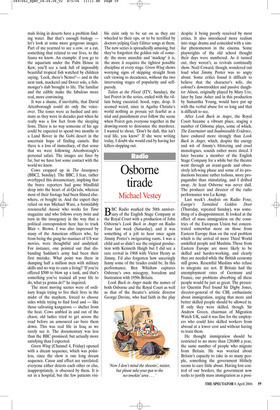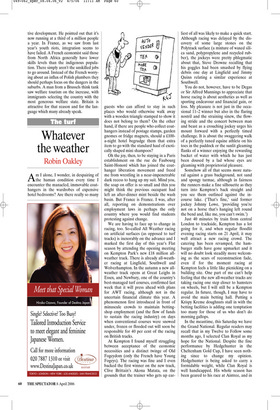Osborne tirade
Michael Vestey
BBC Radio marked the 50th anniversary of the English Stage Company at the Royal Court with a production of John Osborne’s Look Back in Anger on Radio Four last week (Saturday), and it was something of a jolt to hear once again Jimmy Porter’s invigorating rants. I was a child and so didn’t see the original production with Kenneth Haigh but I did see a rare revival in 1968 with Victor Henry as Jimmy. I’d also forgotten how sneeringly funny some of the tirades could be. In this performance, Ben Whishaw captures Osborne’s own misogyny, boredom and frustration with 1950s Britain.
Look Back in Anger made the names of both Osborne and the Royal Court as well as that of the theatre’s artistic director George Devine, who had faith in the play despite it being poorly received by most critics. It also introduced more realism into stage drama and coincided with a similar phenomenon in the cinema. Some playwrights of the old school thought their days were numbered. As it turned out, they weren’t, as revivals continually show. Noël Coward, though, wondered out loud what Jimmy Porter was so angry about. Some critics found it difficult to believe that the character’s wife, the colonel’s downtrodden and passive daughter Alison, originally played by Mary Ure, later by Jane Asher and in this production by Samantha Young, would have put up with the verbal abuse for so long and that is difficult to see.
After Look Back in Anger, the Royal Court became a vibrant place, staging a number of Osborne plays, some of which, The Entertainer and Inadmissable Evidence, have endured more strongly than Look Back in Anger, which, despite the energy and wit of Jimmy’s blistering and cruel monologues, sounds rather more dated. I later became a member of the English Stage Company for a while but the theatre went through an avant-garde and obsessively left-wing phase and some of its productions became rather tedious, more propagandist than stimulating, and I drifted away. At least Osborne was never dull. The producer and director of the radio performance was Lu Kemp.
Last week’s Analysis on Radio Four, Europe’s Tarnished Golden Door (Thursday, repeated Sunday), was something of a disappointment. It looked at the effect of mass immigration on the countries of the European Union but concentrated somewhat more on those from Eastern Europe than on the real problem which is the arrival of more Third World unskilled people and Muslims. Those from Eastern Europe are more likely to be skilled and harder-working, and clearly they are needed while the British economy still grows. Resentful Muslims who refuse to integrate are not. If Britain had the unemployment rates of Germany and France, our problems absorbing all these people would be just as great. The presenter Quentin Peel found Sir Digby Jones, director-general of the CBI, enthusiastic about immigration, urging that more and better skilled people should be allowed in. If only they were skilled, though. Sir Andrew Green, chairman of Migration Watch UK, said it was fine for the employers who could hire skilled workers from abroad at a lower cost and without having to train them.
He thought immigration should be restricted to no more than 120,000 a year, the same number of people who migrate from Britain. He was worried about Britain’s capacity to take in so many people, something the government blithely seems to care little about. Having lost control of our borders, the government now seeks to justify mass immigration as a posi tive development. He pointed out that it’s now running at a third of a million people a year. In France, as we saw from last year’s youth riots, integration seems to have failed. A French economist said those from North Africa generally have lower skills levels than the indigenous population. There simply aren’t the unskilled jobs to go around. Instead of the French worrying about an influx of Polish plumbers they should perhaps focus on the dangers in the suburbs. A man from a Brussels think tank saw welfare tourism on the increase, with immigrants selecting the country with the most generous welfare state. Britain is attractive for that reason and for the language which many already speak.











































































 Previous page
Previous page